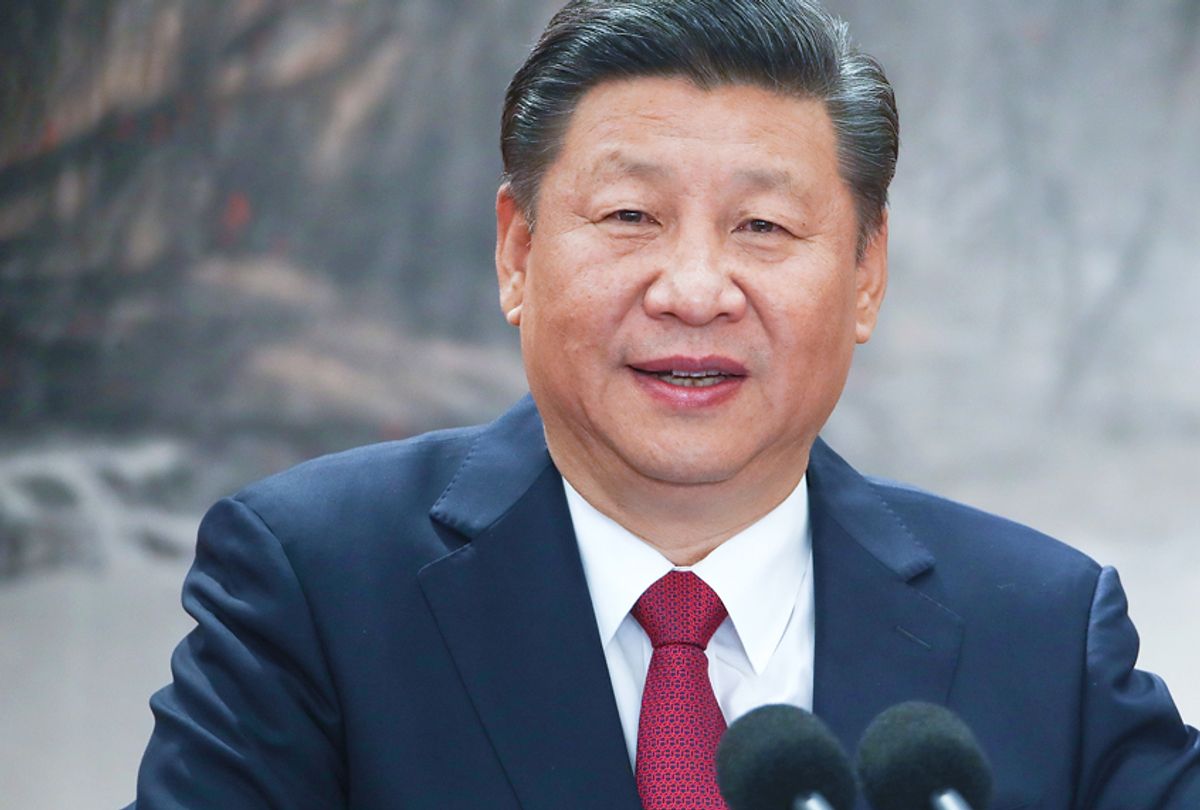President Donald Trump's new tariffs on China have prompted the country to respond by producing a list of potential targets for retaliation — equaling $3 billion worth of American goods, based on imports into China from 2017.
On Friday morning, the Chinese commerce ministry published a list of 128 American products that may suffer from trade-related retaliation as a result of Trump's new tariffs, according to CNBC. These included potential 15 percent tariffs on everything from foods like fresh fruit, wine and dried fruit and nuts to items like steel pipes, ginseng and modified ethanol. For pork and recycled aluminum goods, the tariff rates could reach as high as 25 percent. Soybeans were particularly singled out as a target of potential retaliation by Chinese President Xi Jinping.
On the one hand, there is a silver lining in the fact that China didn't go even further. Although they wound up targeting $3 billion in American imports, American imports to China are expected to reach roughly $172 billion in 2018. And although the Nikkei dropped by 4 percent as a result of the news on Trump's tariffs, the Dow managed to rise o.5 percent in early trading after its initial negative reaction to the news, according to The Guardian.
Nevertheless, it is ominous that China framed its tariffs as merely a response to Trump's aluminum and steel tariffs rather than to the tariffs on $50 billion worth of Chinese imports that he announced on Thursday, according to CNN Money. It suggests that, while President Xi Jinping is willing to go to the negotiating table with Trump in the hope of staving off a trade war, he is also leaving his country with wiggle room to impose more severe trade consequences on the United States in the future.
Part of this may be due to the fact that Xi Jinping can afford to play the long game with Trump, both due to the internal politics in China and the fact that Trump only has a limited amount of time in office.
"A quieter approach that elicited real concessions from Beijing might cast doubt on Xi’s nationalist credentials. By contrast, Trump’s big, very public challenge presents Xi with a stage-perfect opportunity to show himself an inveterate defender of Chinese interests, standing up to yet another Western bully," explained Michael Schuman of Bloomberg.
Schuman continued, "He can do so while being fairly confident of outlasting Trump in a slugfest. Xi, who has set himself up to remain China’s president for life, doesn’t face anything like the near-term political pressures Trump does, with midterm elections looming just months from now."
Mark Williams, chief Asia economist at Capital Economics, echoed those sentiments to CNN Money.
"[Beijing] may want to appear to be standing up to foreign bullying in the coming weeks. But at this stage, they can afford to be fairly relaxed and their response is likely to be limited. China's leaders have no desire to see the global trading system further destabilized," Williams said.
There are also internal political consequences for Trump's decision to potentially kick off a trade war with China. When it comes to White House policymaking, his decision led to the resignation of former National Economic Council Director Gary Cohn earlier this month, as well as the consequent elevation in importance of trade adviser Peter Navarro, who shares Trump's protectionist views on trade.
From a greater historical perspective, Trump's actions on trade mark a major deviation from more than 80 years of American policymaking. The last president before Trump to be an outright protectionist was Herbert Hoover, whose term ended in March 1933. Since Hoover's day, presidents from both parties have taken it for granted that America needed a robust free trade relationship with its economic partners in order to maintain a healthy economy.
If nothing else, China's response to Trump's new tariffs help illustrate why that has been the case. It could very well turn out that Trump is right and that his tariffs will bring China to the negotiating table so that America can address some of its legitimate grievances with the country, such as its practice of currency manipulation and pressuring American companies to disclose their intellectual property. On the other hand, he could have also launched a trade war that will ultimately hurt the pocketbooks of the American working class — that is, the people he most needs to support him if he is to avoid becoming a one-term president.

Shares